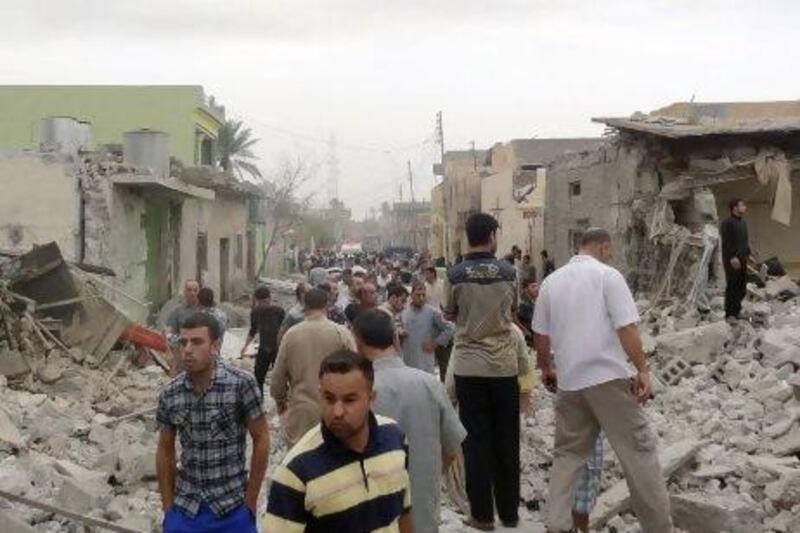The Samarra terror attack in February 2006 sparked more than a year of sectarian violence that threatened to rip Iraq apart.
Last month violence erupted between troops and demonstrators in the northern town of Hawija. Many now ask if history is about to repeat itself.
There is certainly much to worry about. Violence increased after Hawija, with more bombings and firefights between security forces and armed opposition groups.
There also seems to be a qualitative shift in political rhetoric. Sunni Arabs of western Iraq are today more prepared than ever to talk about creating their own federal region or regions. They also are spending far more time courting regional powers such as Turkey and Qatar than talking to the Shiite-led government in Baghdad.
With the tense situation in Syria polarising the whole region along sectarian lines, it is no exaggeration to say that the political problems in Iraq may be at their most acute since the tumultuous civil war period between 2005 and 2007.
At the same time, it is important to take notice of the factors that continue to make the situation in Iraq quite different from what the Balkans experienced in the 1990s, and to avoid rushing to conclusions about partition fixes for political problems for which non-territorial solutions may provide more sustainable arrangements.
For example, it seems significant that the Iraqi army soldiers that have been killed during the latest uptick of violence come from all parts of the Iraqi population and do not represent any particular sect. As an institution, the Iraqi army is vastly stronger today than it was in 2006. Similarly, in the Sunni areas that have seen the most marked change of political rhetoric, a considerable number of moderate politicians continue to urge against violent protest and often speak against the most radical political solutions, such as federalism.
Without making light of Iraq's current problems, it seems prudent to take into account the degree to which our perception of the situation there is - to some extent - the result of punditry by people who have promised mayhem ever since the early days of the Iraq War, and who came to life again with the recent 10th anniversary of the US-led invasion after having had relatively little to write about during the past few years.
Many of the western and Arab critical comments on Iraq converge with respect to attacks on prime minister Nouri Al Maliki and his centralisation of power. This is a time-honoured theme that materialised when Mr Maliki had managed to reestablish a sense of order and security in Iraq in 2008 following years of upheaval. Less attention seems to be given to the question of what the alternative to Mr Al Maliki would be, and whether a return to pre-2008 conditions is really what Iraq and the region needs. Change Mr Al Maliki and everything will be wonderful - as it was in, well, 2005?
Particularly important seems the fact that the Shiite competitors to Mr Al Maliki with whom secularists, Sunnis and Kurds like to flirt are in fact often the ones that push him to make the very decisions to which the opposition takes exception - including unpopular moves in sensitive areas of national reconciliation such as de-Baathification of officials of the Saddam Hussein regime.
Mr Al Maliki's ability to maintain some ties with Sunnis and secularists even in times of crisis is also noteworthy. Amid the recent escalation, the Sunni agriculture minister returned to cabinet whereas an emergency session of parliament designed as an anti-Maliki demonstration failed to attract more than 141 deputies, quite despite the presence of some Shiites including Sadrists. That is significantly less than the 163 MPs needed to depose him.
Perhaps critics of Mr Al Maliki should wait to see how the formation of new provincial councils across the Shiite-majority parts of southern Iraq will shape up over coming weeks and months. In many of those places, Mr Al Maliki is in intense competition with challengers from other Shiite Islamist parties. Recently, Mr Al Maliki has for the first time also indicated preparedness to accept federalism in Sunni areas if legal procedure is adhered to - apparently a conciliatory move that could prompt a more open debate about what the priorities of citizens of those areas really are. It is far from clear that federalism is universally espoused among the Sunnis of northwestern Iraq.
Ironically, in the midst of the deteriorating security situation, local elections in the two Sunni governorates bordering Syria that had been postponed until July because of security problems have actually been moved forward again, this time to June 20. These elections are by their very nature intra-Sunni competitions and, hopefully, they will play out as contests about the provision of local services rather than competitions in Sunnism.
The people of Anbar have chosen pragmatism over extremism before, not least when they expelled Al Qaeda from their own areas in 2006. Perhaps if they study carefully what sort of political forces speaking in the name of Sunnism have been propelled to the forefront in certain parts of Syria lately, Iraqi Sunnis may once more choose pragmatism at the ballot box.
[ foreign.desk@thenational.ae ]
twitter: For breaking news from the Gulf, the Middle East and around the globe follow The National World. Follow us





